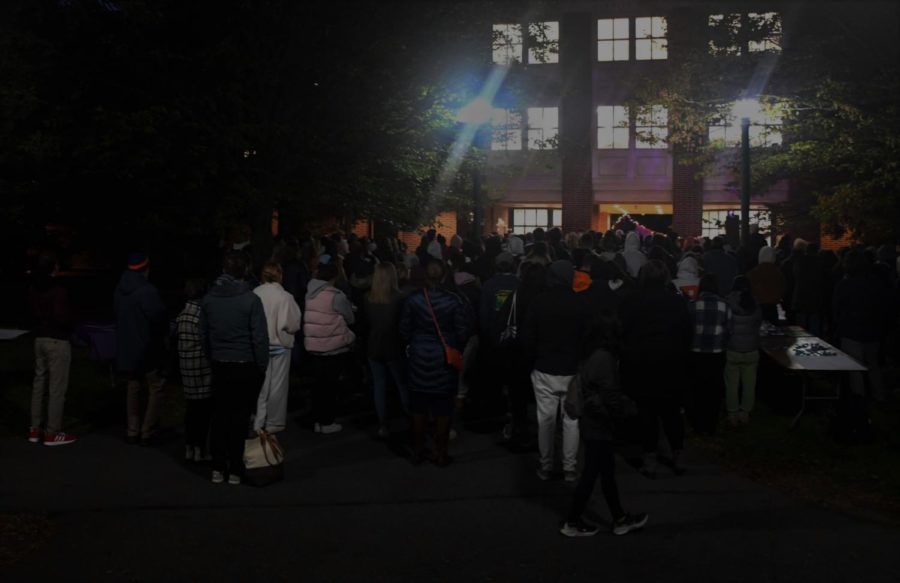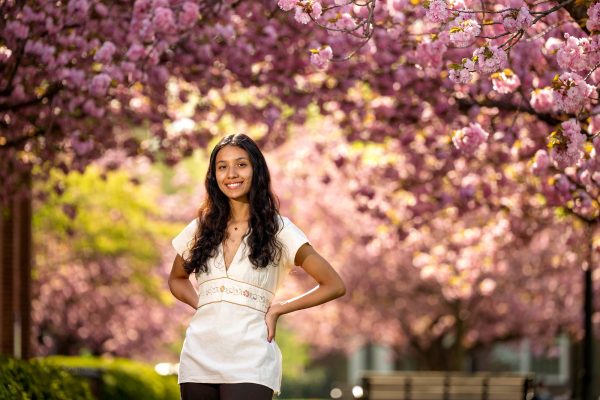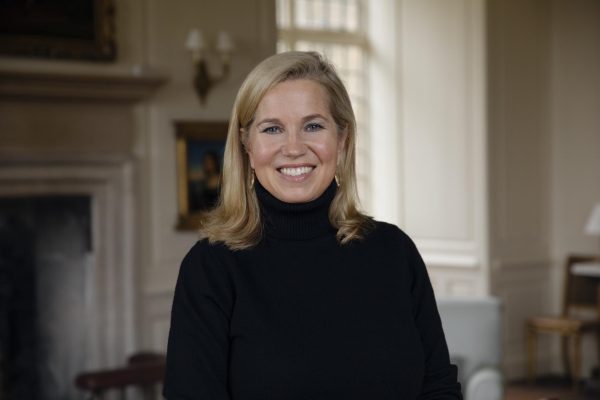University gathers to “Take Back the Night”
Editor’s Note: All of the details and quotes included in this article were shared by the individuals themselves for this publication. It is important to acknowledge that these are their stories to tell and that the issue at hand demands sensitivity and respectfulness.
SpeakUp hosted their annual “Take Back the Night” celebration on Thursday, Nov. 2 for University community members to come together to honor the stories of victims and survivors of sexual violence and/or assault, show support for all individuals affected by the issue and bring awareness to its prevalence on our campus.
This signature event concluded the group’s No More Month programming. Each year, students and faculty come together to share speeches, poetry, singing and other performances. The event ended with a solidarity march around campus. This year, victim-survivors and allies bundled up and gathered in the space between Smith Hall and Vedder Hall.
Opening remarks were given by three members of SpeakUp: Fae Groves ’24, Krystell Ewing ’24 and Helena Strauss ’24. They each spoke about the significance and weight of the event’s purpose as well as the prevalence of sexual violence and sexual assault on the University’s campus and the stigma that surrounds it. In order to address this latter issue, the three read anonymous testimonies compiled from Yik Yak as well as a Google Form in order to collect and share the experiences and perspectives of multiple individuals on campus.
Groves said that one of the major goals of this unconventional speech was “to shed light on the perspectives that are often silenced on this campus: the perspectives of victim-survivors.”
Moreover, she said that the University as an institution should hold itself accountable to its lack of acknowledgement towards sexual assault cases on campus and for being “complicit” towards rape.
She shared that one of the responses that was sent in recalled an assault perpetrated by a member of an athletic team, and when peers found out about the assault, they congratulated the victim for managing to get with the individual.
“This speaks volumes on our campus’ [complicity] towards interpersonal violence,” Groves said.
The event was emceed by Rachel Milio ’22, who introduced each of the following speakers.
The first to the stage was President Bravman. This year, Bravman began by describing sexual violence as a ‘pandemic’ and sharing his own personal connection to the issue. President Bravman said that while much has been done to address the issue on the University’s campus with the efforts of SpeakUp as well as the various staff who have been hired to address sexual violence and other related issues, it still remains a prevailing issue that demands more awareness and action.
Additionally, Sophie Guichardan ’23 gave a speech as VP of Administration on the Bucknell Student Government (BSG). Guichardan shared her personal experiences with sexual harassment and other gender-based injustices in order to illustrate the varying degrees to which sexual misconduct affects so many individuals, especially women, throughout their lives.
The first victim-survivor to speak at this year’s event was Avery Landon ’22. She shared a letter written to a past friend who had failed to serve as a supportive ally.
“I decided to share it this year because I am hoping that it will be cathartic for me and provide me with some much needed closure. While I am nervous and have some reservations about sharing my experience I believe that it is necessary in providing the campus with a narrative about the importance of being a positive bystander and a positive support system for victim-survivors,” Landon said.
Landon shared the following quote with the group:
“Words can do a lot of damage, but a lack of words can do just the same.”
Landon has also been the Events Coordinator of SpeakUp since her sophomore year. Through this position, she’s had the opportunity to plan and organize events such as The Red Flag Campaign and Take Back the Night. The latter event is meant to show campus-wide support for victim-survivors.
The second speaker was Tatiana Roman ’22, who shared a spoken word style poem and speech written about their experience as well as the collective reality of how women and femmes of color are disproportionately targeted and affected by sexual violence, and other forms of violence.
Following Roman was Paris Grigsby ’22. Grigsby told of her experience with not only sexual violence/assault and relationship violence, but also with her healing process. Similar to Landon, she “decided to share [her] experience” because, after having been a SpeakUp peer for all of her four years at the University and having watched Take Back the Night for many years in the past, she “felt comfortable enough to speak out.”
“I also wanted to share because historically this event has had majority, if not only, white speakers and I didn’t want victim-survivor stories to be represented by only one demographic,” Grigsby said.
“I was very nervous sharing my story because I’ve told close friends and family before, but I’ve never spoken about it so publicly. One of the experiences I’m sharing happened my first year of college here at Bucknell, so it’s a full circle moment to share my senior year and reflect on the growth and healing I’ve had,” Grigsby said.
‘Take Back the Night’ “is important because it provides a raw opportunity for victim-survivors and community members to acknowledge one another and support one another,” Grigsby said.
Due to the state of the University during the pandemic, there hasn’t been a Take Back the Night since 2019. Grigsby said she was happy to see its return to campus.
The last student to speak was Zoë Wilson ’23, another avid member of SpeakUp. Wilson contributed to the event by reading a piece written by Professor Meenakshi Ponnuswami discussing her experience with sexual assault and sharing her thoughts on the issue. Professor Ponnuswami was unable to attend ‘Take Back the Night’ this year because it conflicted with her Diwali celebration, and she requested that Wilson read her piece for her.
“I was worried that I would not do her story justice, but the words — politically charged and angry at times, calming and supporting at others — spoke for themselves,” Wilson said.
Wilson shared that she’s known Professor Ponnuswami since her first semester at the University when she led her Foundation Seminar. The two also worked on the staff of the Social Justice Residential College together and over the years they’ve developed a close relationship.
“It meant the world to me when [Ponnuswami] agreed to write a piece for Take Back the Night because her assault story is one of the most cruel but inspiring stories I have ever heard,” Wilson said.
Following the speeches, readings and performances, students at the event participated in the symbolic march. This year, the route went up Saint George Street, down University Avenue and back across Loomis Street. University buildings that were passed include Larison Hall, various affinity houses including Carey House, President Bravman’s house and the Phi Gamma Delta chapter house.
In past years, the march has covered more of the campus and on-campus buildings. Throughout the march, participants chanted cheers, such as “stop the violence, no more silence, take back the night” and “hey hey, ho ho, rape culture has got to go.”
Lindsey Higgins, the University’s Interpersonal Violence Prevention & Advocacy Coordinator, shared her sentiments on the importance of the event.
“I think that Take Back the Night is important because it is a chance for us as a community to center the voices of survivors, confront the realities of campus sexual violence, and reexamine the role we each play in either upholding or challenging the social structures and power dynamics that allow this violence to take place. And hopefully inspiring folx to take action. To interrupt. To intervene. To believe. To support. To embrace their voice,” Higgins said.
This annual event brings up the question of sexual safety and allyship, and what is being done to improve the status of both at the University.
“Sexual safety on this campus, in my opinion, is low. There’s so many factors that play a role but to keep it brief, there’s definitely a culture on campus that perpetuates rape culture and shows blatant disregard for consent and human autonomy,” Grigsby said.
“I think one of my other concerns with sexual safety is that there’s so limited resources on campus that not all victim-survivors are heard and supported in a timely manner,” Grigsby said.
The current resources for all sexual misconduct issues are: Title IX Coordinator and Director of Institutional Equity Samantha Hart, Interpersonal Violence Prevention & Advocacy Coordinator (IVPAC) Lindsey Higgins and, of course, SpeakUP. Related resources include the Counseling & Student Development Center, Bucknell Student Health and Public Safety.
“In this role, my responsibilities are two-fold: coordinating interpersonal and sexual violence prevention education/awareness programming and providing confidential advocacy and support for students affected by interpersonal violence. For me, this looks like supporting the student as they process their experience, exploring their options and resources together, and ultimately empowering them to make informed decisions,” Higgins said.
Under the umbrella of education and awareness programming, Higgins also advises and supports SpeakUp peers; this year, she helped bring the Take Back the Night vision into fruition.
“I do this work because I refuse to accept that campus violence is inevitable. Interpersonal and sexual violence has no place in the college experience and I believe that we have the power to educate ourselves and each other on the social systems that uphold rape culture and then use that knowledge and understanding to work together to shift the culture of our community and create a campus environment that is safe for all students,” Higgins said.
Groves shared her perspective as a Speak Up peer and as a Residential Advisor. She said it seems that the University is putting most of the pressure to improve campus onto students and people of color.
Groves spoke publicly for the contrary, as she repeated it is the responsibility of those in power to address policies and cultures, power dynamics, safe spaces, accountability of perpetrators and support of victim-survivors.
“I think that the state of sexual safety and allyship on this campus needs to improve. You cannot be an ally if you are not willing to outwardly condemn sexual violence and there are not enough people willing to do so,” Landon said in regards to both sexual safety and allyship.
Grigsby elaborated on this notion of allyship.
“I definitely think there are very active and outspoken allies on this campus. However, I do also think there are performative allies on this campus and I would love to see people take their allyship seriously. Speaking out against these issues can be difficult but it’s very necessary to establish a stance and have integrity to uphold your stance in all spaces,” Grigsby said.
“Take Back the Night” functions as one of these spaces. As many students know, it is an event sponsored by SpeakUp—a group of peer educators dedicated to ending power-based interpersonal violence on the University’s campus and beyond.
While most students are familiar with SpeakUp through the workshops attended by first years, which are also offered to returning students as well as on-campus organizations and teams, they also host various events and offer many resources and tools to students.
According to Wilson, their approach “prioritizes spreading awareness about the various forms of sexual violence, the resources available on campus for survivors, and the techniques and tools students can use to intervene before, during, or after an incident.”
Additionally, SpeakUp peers conduct workshops that highlight sexual assault statistics that are nationally collected and are even specific to the University. “one out of three of female-identifying Bucknellians will be assaulted during their four years at Bucknell—this number is deplorable and unacceptable,” Groves said.
“Despite only being a sophomore, it didn’t take long for me to see the complete lack of accountability culture across campus socially and institutionally,” Groves said.
Despite their inactive status during the pandemic, SpeakUp is “attempting to bring back all events in this rebuilding year and then some— like movie/documentary screenings and events geared toward sex positivity and healthy hook ups,” Wilson said. “Their main focus has been increasing connection with the student body, and most importantly, finding ways we could become more actively involved in the community,” Grigsby said.
All of the above members stated the importance of their involvement with SpeakUp and their passion for its causes:
“For me, being a SpeakUp peer means to be an advocate for all underrepresented communities and to help ensure that progress is being made culturally and institutionally around campus,” Groves said.
“SpeakUp is so important to me because it is a place for like minded and passionate people to come together and advocate for a cause that is of the utmost importance on college campuses,” Landon said.
“SpeakUp is important to me because it’s legacy on campus has ebbed and flowed and I want to push it towards a more positive and welcoming space for all students, however, it does take lots of time and effort,” Grigsby said.
“I became a peer because I am passionate about ensuring that victim-survivors are granted the autonomy that was once stripped from them—both by the university and by the culture we students operate within,” Wilson said.
Applications to become a SpeakUp peer are open until Tuesday, Nov. 30 at midnight; directions to apply can be found in the bio of their Instagram page (@speakupbucknell).
























